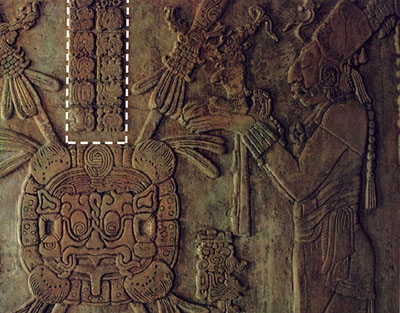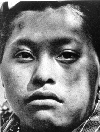Africanized Maya, Olmecs and Classical Maya
![]()
Controversy surrounds the appearance and racial origin of the Olmec people. The evidence shows that they were Africans.
Here we see classical Mayan. Look at the
distinctive facial characteristic especially the nose and lips these features
are not analogous to the contemporary Mayan pictured below.



This contemporary Mayan lacks the distinctive
nose associated with classical Mayan works of art.

This Olmec head on
the otherhand is clearly that of an African in no way
does it resemble the Classical Mayan type. Below we see the African type.

Finally, some researchers claim that the Olmecs were Amerindians, this is false. As you can see
above this picture of a classical Mayan in no way resembles the
"puffy" face features of the Olmec people
who had clearly defined African features. Many contemporary Mayans may appear
to have African features as a result of the mating of Africans and Mayans after
slavery was introduced to the New World.
Researchers have found that some Mayan people
have genetic markers, which point to African ancestors. For example:
Underhill, et al noted that:" One Mayan
male, previously [has been] shown to have an African Y chromosome." -
Underhill, et al (1996) " A pre-Columbian Y
chromosome specific transition with its implications for human evolutionary
history", Proc. Natl. Acad. Science
Paul Manansala has observed that:
Mestizos in Mayan
or nearby areas show significant African admixture.
The East Coast
had extensive admixture according to a recent study by
Lisker et al.
("Genetic Structure in Mesoamerica," _Human Biology_,
June 1996).
The following percentages of African ancestry were found
among East coast
populations:
Paraiso - 21.7%
El Carmen -
28.4%
Veracruz - 25.6%
Saladero - 30.2%
Tamiahua - 40.5%
Among Indian
groups, the Chontal have 5% and the Cora .8% African
admixture.
According to Crawford et al., the mestizo population
of Saltillo has 15.8% African ancestry, while Tlaxcala has 8% and
Cuanalan 18.1%.
The Olmecs built their civilization in the region of the
current states of Veracruz and Tabasco. Now here
again are the percentages of African ancestry according to Lisker
et al.:
Paraiso - 21.7%
El Carmen -
28.4%
Veracruz - 25.6%
Saladero - 30.2%
Tamiahua - 40.5%
Paraiso is in
Tabasco and Veracruz is, of course, in the state of Veracruz. Tamiahua is in northern
Veracruz. [These areas were the first places in
Mexico settled by the Olmecs.] I'm not sure about Saladero and El Carmen.
The mixed Mayans were often called Zambos. They share many features with the young Mayan pictured above.
Dr. Clyde A. Winters
This
page created with Netscape Navigator Gold
Hot Links
Other Afrocentric Links by Dr. C.A. Winters
![]()